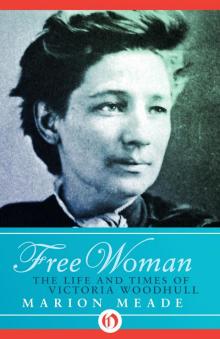- Home
- Marion Meade
Madame Blavatsky Page 12
Madame Blavatsky Read online
Page 12
What H.P.B. surrendered by returning to Nikifor provides some measure of her desperation. Generally able to land on her feet, she found herself at Tiflis in the humiliating position of having no means of support. Bending to her grandfather’s will for survival, she seethed with the resentments that would provoke her to indiscretion during the coming year. Blavatsky remained to her “a fool” who taxed her patience to the limits, and he himself must have soon realized that his sacrifice of job and home in Erivan were all for nothing. Helena may have agreed to live with Nikifor, but one gets the impression that she spent precious little of her time in his company. Most evenings she could be found at the Fadeyev mansion where the importance of the older generation was inevitably giving way to the younger. The Princess was gone, her herbarium had been donated to the University of St. Petersburg, her collection of antiquities and artifacts bequeathed to Nadyezhda. At seventy-one, Andrey Fadeyev was serving as a member of the viceroy’s Board of the Caucasus, but he had begun to feel his age, physically and mentally. As befitted an eminent civil servant with a fifty-year career behind him, he began to compose the obligatory memoirs. By the time Helena appeared on the scene, it was Nadyezhda and Rostislav, both unmarried, who did the entertaining and upheld the Fadeyev reputation as being one of the most socially sought-after salons in the city.
After a faltering beginning, Rostislav had resumed his military career and had gone on to distinguish himself during the conquest of the Caucasus and the Turkish wars. Now a colonel, he had been appointed an aide to the viceroy and was also writing a history, Sixty Years of the Caucasian War. And Nadyezhda, too, had not been idle. In her private apartment in the mansion, she had established a remarkable museum: arms and weapons from all over the world, ancient crockery, Chinese and Japanese idols, Byzantine mosaics, Persian carpets, not to mention statues, paintings, petrified fossils and a library of rare books. Both Nadyezhda and Rostislav cherished Helena and welcomed her back, allowing her to do as she pleased even when it meant going against their father’s wishes.
“Every evening,” remembered Sergei Witte, “the Tiflis society folks would foregather in our house around Yelena Petrovna,” and the reason of course was that everybody wanted to attend a séance. In the 1860s, Russian intellectuals were just beginning to interest themselves in the paranormal and, even though the waves of Spiritualism that had spread over western Europe would not strike them until a decade hence, still they were fascinated by such phenomena. Helena’s séances, wrote Witte,
would last the whole evening and oftentimes the whole night. My cousin did not confine the demonstrations of her power to table rapping, evocation of spirits and similar mediumistic hocus-pocus. On one occasion she caused a closed piano in an adjacent room to emit sounds as if invisible hands were playing upon it. This was done in my presence, at the insistence of one of the guests.
His boyhood attitude toward these performances he describes as “decidedly critical.”56
All knowledge of the séances was kept from Andrey. Each night, at precisely fifteen minutes before eleven, he would say goodnight to the assemblage, one of whom retained a memory of the old man “brushing along the parquets with his warmly muffled-up feet.”57 Once Andrey had retired, the servants would rush in silently with supper trays and close the doors of the drawing room to signal the animated talk to begin.
At the Fadeyevs, as elsewhere in the 1860s, intellectual aristocrats chewed over deep philosophical and political issues as enthusiastically as they downed kvass and tea. Although the emancipation of fifty-two million serfs was only a few months away, these men much preferred to ruminate over the meaning of history, art and life itself. They meditated as well upon Russia’s cultural separateness and special political destiny, and these meditations would come to be the Pan-Slavism of which Rostislav Fadeyev was a leading advocate.
An odd mixture of types participated in the discussions in the Fadeyev drawing room; sunburned officers from the Caucasus battlefields, Freemasons, attaches and generals, foreign visitors, and the intellectual counts and princes who had never found an adequate profession. Once Helena Petrovna made her entrance,
the conversation would be sure to turn suddenly upon the mystic subjects and she herself commence to “evoke spirits.” And then the tall candles would begin to burn low, hardly flickering toward the end, the human figures on the Gobelin tapestry would seem to awaken and move, and each of us feel queer from an involuntary creeping sensation; and this generally lasted until the eastern portion of the sky began itself to pale, on the dark face of the southern night.58
In the darkened room, along with a good sampling of the smart set, was a handsome young baron from Estonia who found Helena absolutely delightful. Nicholas Meyendorff was an enthusiastic Spiritualist and, as it happened, a close friend of D. D. Home, who had recently married a wealthy Russian woman and settled in Russia. So intimate had the two men become, that Home regarded Meyendorff as a brother; therefore, it was natural for Meyendorff, when he became Helena’s lover, to confide the details of the affair to his friend. Probably this was owing less to lack of chivalry than to the fact that Helena was in the habit of bragging about her connection with Home. In response, Home wrote a blistering condemnation and warned Meyendorff against having anything to do with her. However, Home reported regretfully, “he did not follow my advice.”59 Later, full of malice, Meyendorff would tell people that H.P.B. had some mediumistic abilities, but that she cheated. At the time of their liaison, however, he was so much in love with her that he insisted she divorce Blavatsky in order to marry him, or so Helena claimed.60
The affair with Meyendorff, a meaningless alliance at best, must have presented a few problems for Helena because she was living in Nikifor Blavatsky’s home, but if the logistics of living with one man and sleeping with another were not unsettling enough, matters were complicated further by the unexpected arrival of Agardi Metrovitch. Sergei Witte claimed that “one fine morning she was accosted in the street” by her former companion, who “apparently had no doubts as to his rights to my cousin, and did not hesitate to assert his claims.”61 He could not have asserted them too vigorously, because Helena continued to live with Blavatsky, at least for a time, but Witte may have been euphemistically referring to a resumption of their sexual relationship.
That Metrovitch visited Tiflis we know from H.P.B. herself. She wrote to Alfred Sinnett in 1886 that her family “knew him well and he was friends with my cousins Witte.”62 She insisted, however, that he had come there with his wife, also a singer, and the pen drawing of him in Faust shows him whispering seductions into the ear of a praying Marguerite. Under this drawing, there is a penciled caption: “Teresina Signora Metrovitch (Faust).”63 H.P.B. could never keep straight her stories about Metrovitch’s having a wife, because elsewhere she referred to the woman as Nathalie. Most likely the picture was of a singer in the Tiflis opera company, the caption added at a much later date when Helena was determined to thwart “the slanderous and venomous mad-dogs who poke their noses under cover of the night into every family’s and every individual’s private lives.”64
Metrovitch, almost sixty in 1861, was declining both artistically and otherwise, and his pursuit of Helena was due to economic as much as emotional needs. He had wrangled an engagement with the Italian opera of Tiflis, undoubtedly a bit of a comedown since the city’s opera company was less than ten years old and scarcely on a par with even the worst of European companies, but he also wanted Helena back. For a short period she was able to juggle (one wonders how) her husband, her former lover, and her current lover, until she was struck by a catastrophe of major proportions. She found herself pregnant.
This type of ghastly accident was, of course, the nightmarish hazard for any Victorian woman reckless enough to indulge in premarital or extramarital sex. If marriage was out of the question, the most common solution was to find some secluded spot where nobody knew her, give birth secretly, and then discreetly arrange for adoption. With few exceptions did a wom
an think of openly bearing an illegitimate child and raising it as her own. Perhaps H.P.B. might have, for she had less regard for the proprieties than most women, but the social position of the Fadeyevs precluded any such avant-garde flaunting of one’s individuality. Indeed, the pregnancy posed a major scandal not only for the Fadeyevs and Wittes, but also for Nikifor Blavatsky, who was obviously not the father, and for Nicholas Meyendorff, whom Helena bluntly claimed was. Meyendorff, denying paternity, asserted that Agardi Metrovitch was responsible. In short, the situation rapidly disintegrated into a complete mess, with accusations and counter-accusations, wringing of hands and general consternation for all parties concerned.
When the pregnancy could be hidden by neither hoopskirts nor the baggy getups Helena favored, she left Tiflis for the Province of Mingrelia where running into people she knew would be unlikely. The region was covered with dense primeval forests of beeches, oaks, chestnuts and cherry trees, whose branches were festooned with bunches of wild red grapes, sour and inedible. There were no roads, only trails for horses, and it was possible to travel all day without seeing a village. Here and there, where the forest had been cleared, one might come upon an isolated log house surrounded by a few acres of millet and maize. The single-room dwellings had two doors, but no windows or chimney, and furniture was rare. Even the palace of the ruling prince boasted only a few badly made tables and chairs.65
Along the major trails, at intervals of ten to twelve miles, there were military posts manned by cossack soldiers. While invariably the men had samovars, their diet was a frugal one limited to what they could raise, in addition to eggs, milk and a poor quality wheat bread. It was to the settlement at Ozurgety that Helena retired for her accouchement and bought a house. Unlike other posts, Ozurgety had in residence an army surgeon, undoubtedly the reason she chose it for her confinement. Even though she had four servants to care for her and a monthly allowance from Nikifor Blavatsky, she felt miserably alone. More disturbing, the privacy she expected was not forthcoming, since word of her presence spread quickly. “Public opinion,” wrote Vera, “became furious, and society... made an open levee of arms against one of its own members who dared to defy its time-hallowed laws, and act as no respectable person would. The whole country was talking of her.”66 The outraged Mingrelians objected to Helena, her sister claimed, because she preferred the peasants and their smoky huts to the “brilliant drawing rooms”67 of the nobility. Since drawing rooms, brilliant or otherwise, did not exist in Mingrelia, this account is fanciful, to say the least. The real objection, one surmises, was her sister’s pregnancy.
Disgraced and banished, a pariah not only in Tiflis but also among the crude Mingrelians, Helena grew increasingly depressed. Her cries for help and understanding were ignored because when she wrote to Katherine Witte for additional money, she received a cutting reply: “One could believe that you have not a kopeck, like other poor people. And one would be very much surprised learning that you receive one hundred roubles every month. Because I am quite sure you are receiving them, with the exception of one of the winter months when Blavatsky did not get his salary either.”68
The exact date of Yuri’s birth is unknown. Since there exists a passport, dated August 23 (Old Style), 1862, and designating him as an infant, he must have been born in 1862, or possibly in late 1861. The infant was deformed, owing either to a birth defect or the clumsy obstetrical handling of an army physician unaccustomed to delivering babies; the exact nature of the handicap is not clear, but H.P.B. referred to him as “that poor cripple child” and relatives of Meyendorff explained that he had a hunchback.69 Helena reacted with a breakdown in which she seems to have dissevered herself from the corporeal world.
Whenever I was called by name, I opened my eyes upon hearing it, and was myself, my own personality in every particular. As soon as I was left alone, however, I relapsed into my usual, half-dreamy condition, and became somebody else.70
Refusing to eat, she soon “was reduced to a living skeleton.” Fevers were prevalent in Mingrelia, particularly among those unaccustomed to the climate, but Helena later insisted that she had not been delirious.
When awake and myself I remembered well who I was in my second capacity, and what I had been and was doing. When somebody else, i.e., the personage I had become, I know I had no idea of who was H. P. Blavatsky! I was in another far-off country, a totally different individuality from myself, and had no connection at all with my actual life.71
Probably a cluster of factors contributed to her dissociative state: a difficult birth or postpartum complications, the shock of bearing a deformed child, and her normal tendency to escape pain by withdrawing into an alternate reality. By putting these elements together, one can perhaps make a more educated guess about her debilitated condition than, for instance, Vera who described it to Alfred Sinnett as “one of those mysterious nervous diseases that baffle science,” or even than Madame Blavatsky herself, who said that she began “to lead a double life” at Mingrelia.72 Both of them, understandably, avoided any reference to the tragedy of Yuri as having played a role in H.P.B.’s collapse.
The doctor at Ozurgety, feeling unqualified to deal with the situation, “packed her off to Tiflis. Unable to go on horseback, owing to her great weakness, and a journey in a cart being deemed dangerous, she was sent off in a large native boat along the river.”73 During the four-day journey to Kutais, down a narrow, barely navigable river, Helena began to hallucinate. She had the sensation that she had somehow seeped out of her physical body, which she left at the bottom of the boat, while she glided across the water into the forest. At Kutais, three of the servants disappeared; only the butler remained with Yuri and her until the carriage and escort dispatched by the Fadeyevs showed up to collect them. By the time they reached Tiflis, she had to be carried into the house more dead than alive.
In the calming atmosphere of her aunt’s apartment, nursed by Nadyezhda and Rostislav, Helena’s psychic and physical health began gradually to return. She would lie on the sofa while Nadyezhda sat near by, writing. Once, opening her eyes, she saw Rostislav “bending over me with so much sadness and pity in his face that I jumped to my feet and actually burst into tears.”74 The time was approaching when she had to make decisions about herself and the child: where they would live and, more important, how. Whether at H.P.B.’s request or for other reasons, Agardi Metrovitch had returned to Europe. As for Nikifor, he had done more than his duty by sending her money in Mingrelia and even afterward he continued to show compassion for her plight. Sometime during the summer of 1862 he filed a petition for the previously mentioned passport, which enabled Madame Blavatsky “accompanied by their infant ward Yury,”75 to visit the provinces of Tauris, Cherson and Pskov. The curious wording of the petition was meant to give the illegitimate child some semilegal status, short of adoption.
In fact, it did no such thing. No one, including Helena herself, really tried to palm off Yuri as someone else’s child. And yet, later on, she would insist that she had never borne a child, since she was incapable of either sexual relations or reproduction owing to “a congenital crookedness of the uterus.” As if that were not frightful enough, “I am lacking something and the place is filled up with some crooked cucumber.”76 Yuri, she declared, was the illegitimate son of Nicholas Meyendorff and a friend of hers: H.P.B. adopted the child to protect her friend’s reputation. Her explanations were so mind-boggling that Sinnett got smothered in their tricky turns and twists and ended by not mentioning Yuri at all.
In the meantime, Helena was facing up to reality. Her baby, not only deformed but suffering poor health in general, required more medical attention than a normal child. Thinking about his welfare, as well as her own, she asked Meyendorff for financial support. After consulting with his brothers, he again protested that he was not the father,77 but in the end he agreed to pay. Whether he ever saw Yuri is impossible to say, but, according to his sister-in-law’s report, H.P.B. sent him photographs of herself with the baby.78
&
nbsp; There is no doubt that she loved the crippled child who, by some terrible irony, resembled the little hunchback invisible that she had played with in her own childhood at Saratov. Yuri was “the only being who made life worth living, a being whom I loved according to the phraseology of Hamlet as ‘forty thousand fathers and brothers will never love their children and sisters.’”79 The boy brought out in her the deep compassion that she reserved for those suffering from any kind of disadvantage, those who for one reason or another could not protect themselves.
She might have hidden Yuri, but she did not. In 1862 or ‘63, using the passport that Nikifor had obtained for her, she took Yuri to visit her father, who was then living in the Province of Pskov. She told him that Yuri had been adopted but von Hahn was nobody’s fool and “even my own father suspected me.” There must have been agitating scenes about Yuri’s true paternity, because finally Helena felt compelled to consult two Pskov physicians, professors Bodkin and Pirogoff, who obligingly provided her with a certificate affirming her inability to bear a child. “Had it not been for the doctors’ certificate [father] would never have forgiven me, perhaps. After, he loved and pitied that poor cripple child.”80 Perhaps she went through this farce more for Yuri’s sake than her own. As much as she valued her father’s goodwill, she had done without it before and might have done so now. What she could not endure was that anyone should bear ill will toward her son.
It is a pity that Victorian morals forced her to tell so many lies about Yuri. In spite of her frenzied denials, in spite of her protests that she “never bore a weazel [sic],”81 she was, nonetheless, a mother and an exceedingly good one, adoring her child and making her life subservient to his. She had never found in the love of a man that ecstasy of happiness that lifts one out of one’s self. She later would say, referring presumably to Metrovitch, “I loved one man deeply but still more I loved occult science,”82 but the one she loved “more than anyone else in all the world,” or anything, was Yuri. He was frequently ill and, even when well, needed constant attendance. What this responsibility did was force her to focus outwardly instead of habitually retreating into trances, and now she began a struggle to overcome “every trance of mediumship outside her will, or beyond her direct control.” This transformation did not take place overnight, however, and it was not until several years later that she would be able to write Vera, “Now I shall never be subjected to external influences.”83

 Eleanor of Aquitaine
Eleanor of Aquitaine Free Woman
Free Woman Unruly Life of Woody Allen
Unruly Life of Woody Allen Bobbed Hair and Bathtub Gin
Bobbed Hair and Bathtub Gin Madame Blavatsky
Madame Blavatsky Stealing Heaven
Stealing Heaven Dorothy Parker: What Fresh Hell Is This?
Dorothy Parker: What Fresh Hell Is This? The Last Days of Dorothy Parker
The Last Days of Dorothy Parker